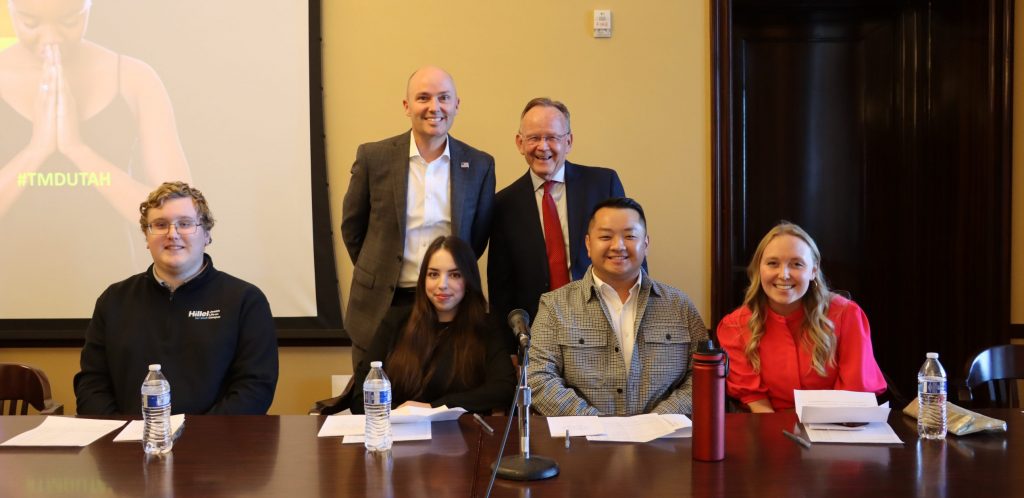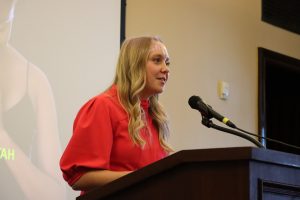2023 Tolerance Means Dialogue

Front row (left to right): Aspen Marshall, Kimball Yeates, Pheng Lor, Sarah Johns. Back row : Governor Spencer Cox, Utah State Senate President Stuart J. Adams
Tolerance Means Dialogue hosted an event at the Utah State Capitol on October 30 from 5-6:15 pm. The event was co-sponsored by the University of Utah and the International Center for Law and Religion Studies at Brigham Young University Law School. Additional sponsors included Equality Utah, the 1st Amendment Partnership, the Fairness for All Initiative, Braver Angels and the Federalist Society at both BYU and the U’s law schools.
Utah Governor Spencer Cox opened the event. A panel was co- moderated by Jason Perry, U vice president for government relations and director of the Hinckley Institute of Politics, and Elizabeth Clark, associate director and interim chair for law and religion studies at BYU. Utah has staked out overwhelmingly bipartisan consensus on some of the most deeply divisive issues in American—most recently by unanimously banning gay conversion therapy while giving therapists assurances that they can serve children’s needs. Panelists William N. Eskridge of Yale Law School, Robin Fretwell Wilson of Tolerance Means Dialogues and The University of Illinois College of Law, and Mike Peterson of the Utah House of Representatives talked about how lawmakers forged common ground and how this process can serve as a model for America on contentious matters—to embrace civil rights for all. Utah State Senator J. Stuart Adams closed the event.
Scholarships were presented to winning essays on the topic of bridging divides in America today. Undergraduate and graduate students from BYU, University of Utah, and any colleges or universities within a 100-mile radius of the U and BYU were invited to submit essays. Undergraduate scholarship winners are Aspen Marshall, University of Utah, and Kimball Yeates, Brigham Young University. Graduate scholarship winners are Pheng Lor, University of Utah, and Sarah Johns, BYU Law School. Essays are available on tolerancemeans.com. Each student presented their winning essays.
Watch the event here. Photos of the event are available here.
From the Deseret News article by Jacob Hess:
College student Kimball Yeates remembers standing with her parents in a dusty Presbyterian church as she prepared to vote in her first primary election. When the woman working the poll booth asked what ballot she would like, her parents both requested Republican ballots, while she asked for a Democratic one.
“How did that happen?” the poll worker asked.
“I wish I knew,” her father said with a smile.
This 20-year-old student originally from Kansas City, Missouri, was featured at an event at the Utah Capitol Monday night as a winner of a tolerance-themed essay contest for universities in Utah.
It’s not only in distant ideological conflicts where greater tolerance is needed, Yeates said, but also right in our own families and homes.
The evening was convened by a broad array of national and local groups, including Tolerance Means Dialogue, Braver Angels, Equality Utah, the Fairness for All Initiative, 1st Amendment Partnership, University of Utah, Brigham Young University Law School’s International Center for Law and Religion Studies and the Federalist Society at the law schools of both BYU and the University of Utah.
The evening began with short remarks by several dialogue leaders, including Yale and University of Illinois law professors William Eskridge and Robin Fretwell Wilson, as well as Utah state Rep. Michael Peterson, R-North Logan, and Gov. Spencer Cox.
Experiences of late have led Cox to become both “more pessimistic and more optimistic at the same time.”
On one hand, many experts are now cautioning that the hyperpolarization in America is simply not sustainable. We’re crossing every threshold towards a failed state, the governor warned.
“This ends one of two ways,” said Cox. “Either we the people collectively decide we’re going to stop hating our fellow Americans — or we’ll start shooting each other.”
Conflict overseas loomed over the discussion.
Undergraduate Aspen Marshall mentioned the Israeli-Palestinian conflict as something important to her as a Jewish student at the University of Utah. She expressed concern that the sharpening binaries in popular discussion of the Israeli-Palestinian conflict could lead to even greater danger for both groups as hostilities between Jews and Muslims are fomented.
“I believe it’s possible to be both pro-Israel and pro-Palestine. Both countries deserve to exist, and their citizens deserve to live in peace and prosperity,” Marshall said during her remarks.
Audience members asked how people can speak freely or make mistakes without “subjecting themselves to cancel culture” and whether it’s appropriate to have a “red line” where people say “I’ll talk with you if you’re here — but if you’re there, I won’t talk with you.”
Open-hearted dialogue “does not require retreat from the ground of one’s deeply held beliefs, instead, it requires that we entreat each other to love through our differences,” said Sarah Johns, a student at BYU law school.
Cox agreed, saying “our nation was founded on profound disagreement.”
“I’m not asking anyone to give up any iota of what they hold dear. That’s not what this is at all. It’s about disagreeing in the right ways.”
In reference to the Utah legislature, professor Robin Fretwell Wilson marveled how “again and again and again” this body of political leaders “has managed to solve culture war issues by de-escalating — signaling that “this needs to stop” and bringing everyone in the same room.
Yale professor William Eskridge, a longtime proponent of gay rights, spoke admiringly of the Fairness for All initiative in Utah, reflective of the centrality of peacemaking that, he said, was “very much within the tradition of the Church of Jesus Christ.”
In closing remarks, Utah state Senate President Stuart Adams insisted the famous cooperation in Utah between advocates of gay rights and religious freedom was not a compromise — arguing that neither side would have agreed to anything that compromised their beliefs.
“We did something that didn’t require anyone to compromise their beliefs — but instead to protect them.”
Adams said just as his earlier advocacy for a constitutional amendment defining marriage as between a man and a woman was consistent with his faith, so were his more recent efforts to advance Fairness for All, protecting religious freedom and gay rights.
The Senate president closed with three challenges to attendees — “stand up and try to protect someone you don’t agree with,” “try to listen to someone you don’t agree with” and “try to understand someone you don’t agree with.”
Elizabeth A. Clark, associate director of the International Center for Law and Religion Studies at BYU Law, and Jason Perry, director of the Hinckley Institute of Politics at the University of Utah, helped moderate the discussion.
“We can’t solve any of the biggest problems in our country if we hate each other,” Cox said — reiterating a centerpiece of his new Disagree Better initiative with the National Governors Association.
